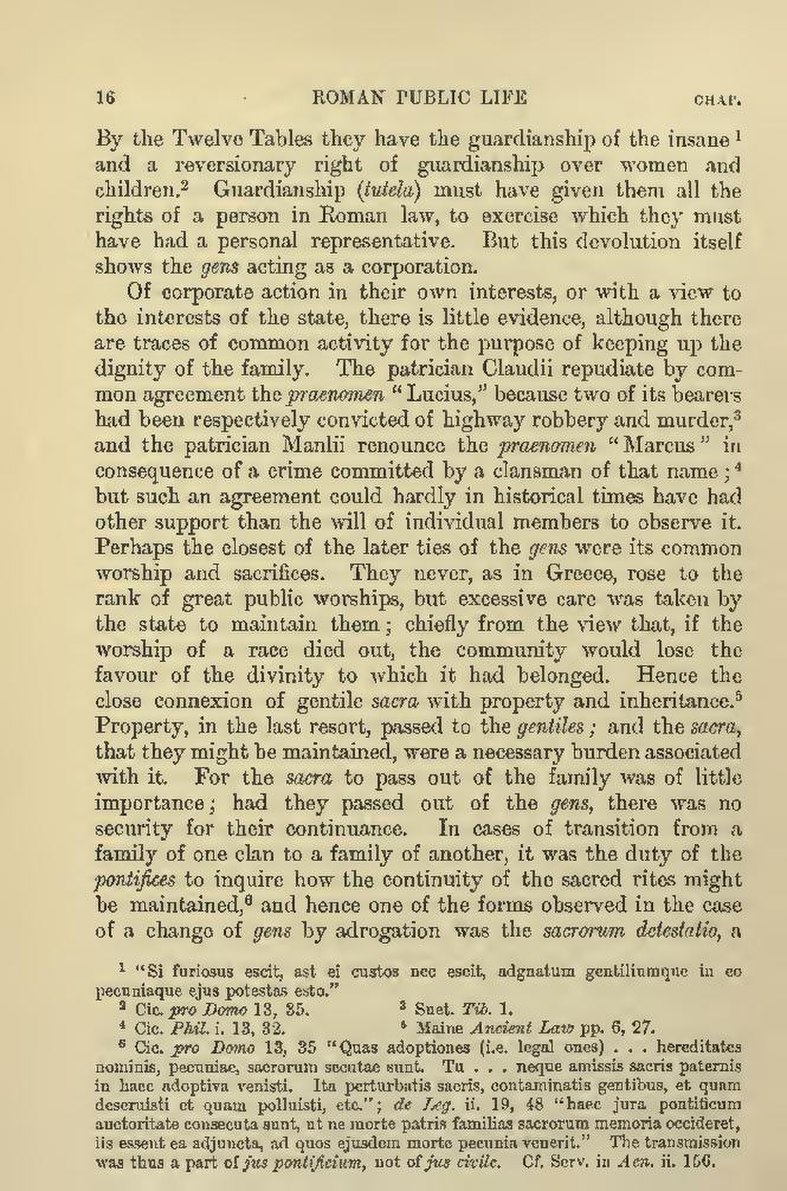By the Twelve Tables they have the guardianship of the insane[1] and a reversionary right of guardianship over women and children.[2] Guardianship (tutela) must have given them all the rights of a person in Roman law, to exercise which they must have had a personal representative. But this devolution itself shows the gens acting as a corporation.
Of corporate action in their own interests, or with a view to the interests of the state, there is little evidence, although there are traces of common activity for the purpose of keeping up the dignity of the family. The patrician Claudii repudiate by common agreement the praenomen "Lucius," because two of its bearers had been respectively convicted of highway robbery and murder,[3] and the patrician Manlii renounce the praenomen "Marcus" in consequence of a crime committed by a clansman of that name;[4] but such an agreement could hardly in historical times have had other support than the will of individual members to observe it. Perhaps the closest of the later ties of the gens were its common worship and sacrifices. They never, as in Greece, rose to the rank of great public worships, but excessive care was taken by the state to maintain them; chiefly from the view that, if the worship of a race died out, the community would lose the favour of the divinity to which it had belonged. Hence the close connexion of gentile sacra with property and inheritance.[5] Property, in the last resort, passed to the gentiles; and the sacra, that they might be maintained, were a necessary burden associated with it. For the sacra to pass out of the family was of little importance; had they passed out of the gens, there was no security for their continuance. In cases of transition from a family of one clan to a family of another, it was the duty of the pontifices to inquire how the continuity of the sacred rites might be maintained,[6] and hence one of the forms observed in the case of a change of gens by adrogation was the sacrorum detestatio, a
- ↑ "Si furiosus escit, ast ei custos nec escit, adgnatum gentiliumque in eo pecuniaque ejus potestas esto."
- ↑ Cic. pro Domo 13, 35.
- ↑ Suet. Tib. 1.
- ↑ Cic. Phil. i. 13, 32.
- ↑ Maine Ancient Law pp. 6, 27.
- ↑ Cic. pro Domo 13, 35 "Quas adoptiones (i.e. legal ones) . . . hereditates nominis, pecuniae, sacrorum secutae sunt. Tu . . . neque amissis sacris paternis in haec adoptiva venisti. Ita perturbatis sacris, contaminatis gentibus, et quam deseruisti et quam polluisti, etc."; de Leg. ii. 19, 48 "haec jura pontificum auctoritate consecuta sunt, ut ne morte patris familias sacrorum memoria occideret, iis essent ea adjuncta, ad quos ejusdem morte pecunia venerit." The transmission was thus a part of jus pontificium, not of jus civile. Cf. Serv. in Aen. ii. 156.
